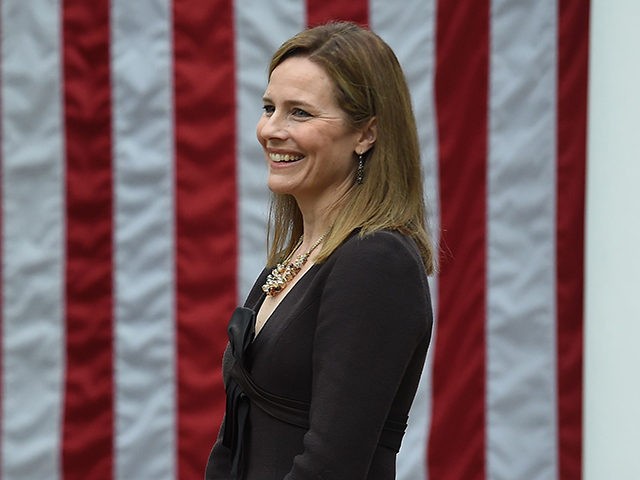A plurality of voters want to see Federal Judge for the U.S. Court of Appeals for the Seventh Circuit Amy Coney Barrett confirmed to the Supreme Court, according to a Just the News Daily Poll with Scott Rasmussen released on Monday.
The poll found that 37 percent of voters favor Barrett’s confirmation by the United States Senate, while 30 percent oppose her confirmation, for a net approval of plus seven for confirmation. Thirty-three percent were undecided.
“It’s important to remember that 46% of voters had either never heard of Barrett or didn’t know enough to have an opinion of her,” pollster Scott Rasmussen told Just the News.
“These results are especially interesting in light of the questions some have about the nomination process. While polls show that many voters would have preferred waiting on the nomination until after the election, there is a generally positive reaction to the nominee herself,” Rasmussen added.
The poll of 1,000 registered voters was conducted online on Saturday, September 26, in two hours immediately after President Trump nominated Barrett to the Supreme Court that day at 5 p.m. eastern time.
Public support for Barrett’s confirmation at net approval of plus seven is very similar to support for the confirmation of Justice Brett Kavanaugh, which stood at an average net approval of plus six in the days immediately after President Trump nominated him to the Supreme Court on July 9, 2018.
But then the Democrats launched an all-out attack on Kavanaugh’s character in an effort to derail his confirmation.
“Kavanaugh’s support keeps falling,” Fivethirtyeight.com reported on the eve of the Kavanaugh confirmation on October 5, 2018.
The average net approval for the confirmation of Kavanaugh dropped from plus six in mid-July to negative four on October 3. There was a huge gender gap, with the average net approval for confirmation among women dropping from negative 2 in mid-July to negative 14 on October 3 and the average net approval among men dropping from plus 16 in mid-July to plus four on October 3.
Notably, the drop in net approval for Kavanaugh did not come until September 16 when Christine Blasey Ford publicly alleged he had sexually assaulted her more than 30 years earlier. These allegations, subsequently uncorroborated, came more than 60 days after Kavanaugh was nominated by President Trump.
The confirmation process for Judge Barrett will be much shorter than it was for Judge Kavanaugh, who was confirmed by the Senate on October 6, 2018, almost three months after he was nominated, in a 50 to 48 vote. At the time of the vote, Republicans held a slim 51 to 49 majority in the Senate.
Nominated 38 days before November 3, the president and Senate Minority Leader Mitch McConnell (R-KY) have both made it clear they intend to have a floor vote on the Senate before the election.
The Judiciary Committee hearings are scheduled to begin on October 12, and a floor vote could come as early as October 26.
Since Republicans hold a 53 to 47 advantage in the Senate, and only two Republican senators, Sen. Susan Collins (R-ME) and Sen. Lisa Murkowski (R-AK), have indicated they are likely to vote no, Judge Barrett appears to be in a good position to be confirmed before the November 3 election.
Many Senate Democrats, however, have indicated a willingness to use every procedural tool available to them to oppose the holding of a confirmation vote. In the politically topsy-turvy 2020 election year, it is hard to rule out the possibility that something unanticipated could happen.
A look at the crosstabs of the Just the News Daily Poll with Scott Rasmussen released on Monday suggests that Judge Barrett starts from a stronger position in public support than did Judge Kavanaugh in 2018.
Thirty-one percent of women favor the confirmation of Judge Barrett, while 28 percent oppose her confirmation, for a net approval for confirmation of plus three. Forty-one percent of women are undecided.
Forty-three percent of men favor the confirmation of Judge Barrett, while 33 percent oppose her confirmation, for a net approval for confirmation of plus ten. Twenty-four percent of men are undecided.
The partisan divide is significant, with 68 percent of Republicans favoring her confirmation and only six percent opposing it. Among Democrats, 52 percent oppose her confirmation while 19 percent support it. Independents are about equally divided, with 26 percent favoring her confirmation and 28 percent opposing it.

COMMENTS
Please let us know if you're having issues with commenting.